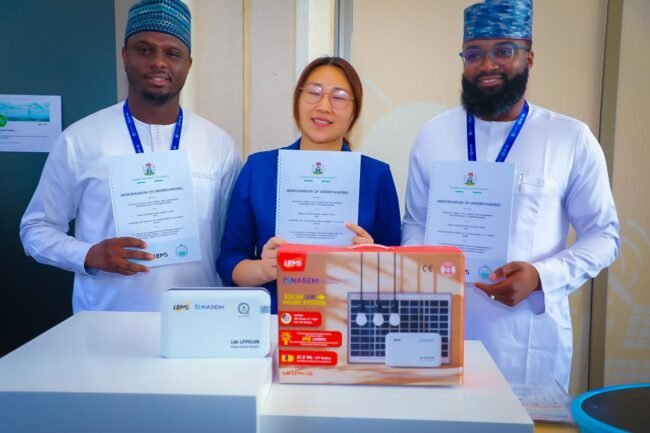The Rural Electrification Agency (REA) and the National Agency for Science and Engineering Infrastructure (NASENI) have signed a $150 million deal with Chinese investors for battery manufacturing.
Malam Mutari Ibrahim, the Director of Promotion and Outreach (PIO) at REA, announced this in a statement released in Abuja on Friday.
The agreement was made with SHENZEN LEMI Technology Development Company.
The Ministry of Power, in collaboration with the China Ministry of Ecology and Environment, facilitated the signing of the agreement as a result of Nigeria’s participation in COP 28 in Dubai.
The collaboration aims to support the establishment of a facility in Nigeria that specialises in manufacturing and processing lithium-ion batteries.
“The initiative, which is backed by a $150 million investment from LEMI, is scheduled to commence in phases, starting in the 2nd quarter of 2024.
“The China Ministry of Ecology and Environment, in collaboration with the Ministry of Power, expressed enthusiasm for being part of this transformative agreement.
“The signing of the cooperation agreement is anticipated to serve as a pioneering initiative for the Light and Belt Initiative in Africa, aligning with global efforts to drive climate technology development and transfer,” he said.
Ibrahim further explained that the collaboration is intended to strengthen NASENI’s role in research and development for capital goods, which is a key aspect of their new leadership’s agenda.
The main objective is to improve the local mass production of standard parts through production and reverse engineering.
The agreement will also contribute to the advancement of the nation’s technology, with a particular emphasis on the electricity sector.
“Furthermore, the collaboration underscores REA’s commitment to bridging the climate technology gap and combating the adverse effects of climate change.
“It also aligns with the country’s ambitious goals of achieving universal electricity access by 2030 and net zero emissions by 2060,” he said.
Ibrahim stated that the partnership aims to promote the development and transfer of climate technology, support local industrialization, and facilitate commercialization.
The main goals are to improve collaboration between the public and private sectors, create jobs, stimulate economic growth, and provide support to the extractive industry.
“Enhance public-private cooperation and contribute to job creation, economic growth, and the extractive industry in the country.
“Recognising the crucial role of energy storage in the transition to renewable energy sources, the investment in Lithium-Ion energy storage manufacturing signifies a significant step towards achieving a low-carbon economy.
“Research indicates that lithium-ion energy storage has the potential to reduce CO2 emissions by more than 20 percent per Kilo Watts per hour (KWh) capacity compared to traditional lead-acid technology,” he said.
438 Words
3 Errors
Fix All Errors
QuillBot Privacy Policy and Terms of Service apply.





